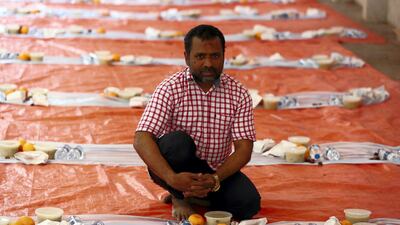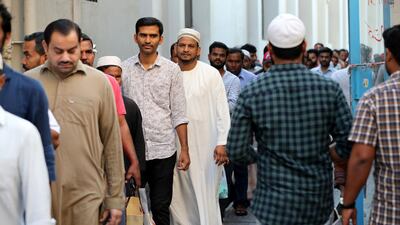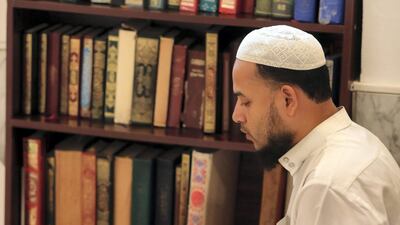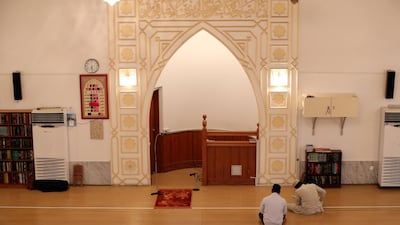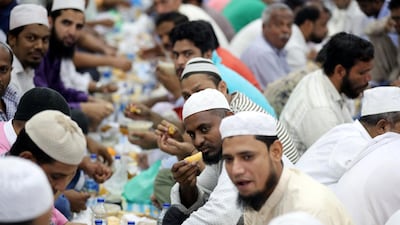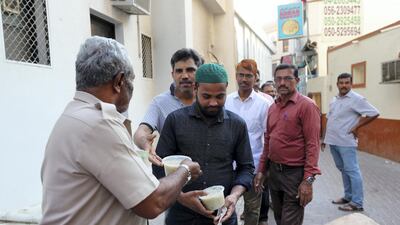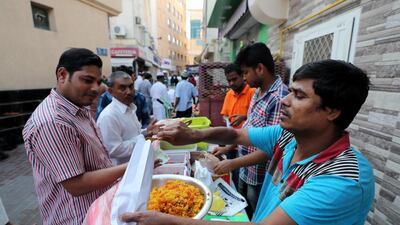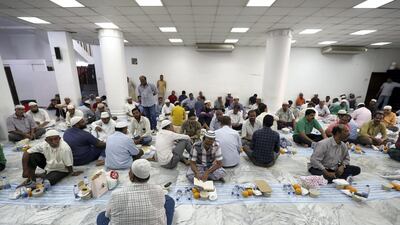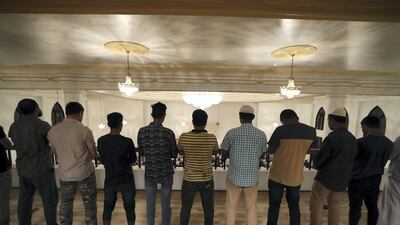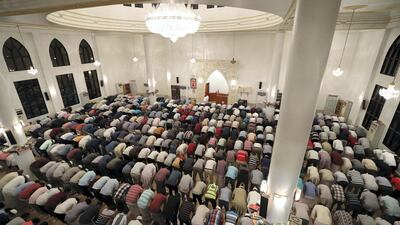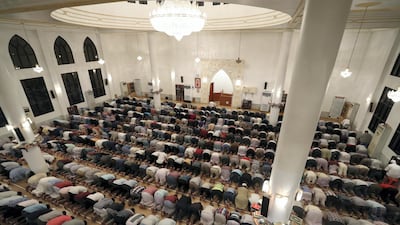Lootah Mosque in the Dubai heartland of Deira may seem unremarkable to many at first sight.
Yet mere bricks and mortar can't tell the story of a place of worship built on decades of warm memories and friendships formed.
The welcoming, family atmosphere of the mosque draws in big crowds of people from all over the emirate, some who hail from Africa and Asia as well as many parts of the Arab world.
Those worshippers - some of whom have called it a home from home for 50 years - come back to reflect every Ramadan.
They meet up with friends who live in the surrounding squat buildings, set on narrow alleys teeming with textile shops and small restaurants.
“This was the biggest mosque when I came to Dubai in 1971,” said Noor Mohammed, 65, who runs a food trading business.
“There were just 25 to 30 of us in the mosque and we would sit and talk for hours. Now the place is full, people are always streaming in.”
Mr Mohammed worked in a shipping firm when he moved to the emirate as a 17-year-old from southern India and remembers a quiet neighbourhood in which people congregated near the mosque.
“This place is like family. We all started out here, there is a lot of love and remembrance,” he said.
Inside the mosque, changes have taken place gradually over the past decade to accommodate larger crowds from nearby residents and tourists who stop by after visiting the gold market in Deira.
Grey-white vinyl flooring has replaced the red carpet that once covered the entire lower level, small chandeliers now glow in the main prayer area in place of bright tube lights and an open porch area where people chatted after evening prayers has been enclosed to make more space for worshippers.
What remains is the sense of community.
Old timers remain grateful to the prominent Lootah family in Dubai for supporting the mosque since the 1970s and taking care of renovation work.
“This mosque makes me feel happy,” said Sultan Alaudeen, 42, a bank client service officer.
"There are other mosques that are bigger and more impressive but this has a special place in my heart because it is where I came 15 years ago when I moved to Dubai."
During Ramadan, Mr Alaudeen and his friends fill spicy biryani into containers for iftar and distribute food to thousands who patiently sit on lanes around the mosque lined with plastic sheets.
They volunteer with the Iman Cultural Centre, a charity group, that begins work from early afternoon in small outer rooms of the mosque.
The men prepare food parcels by adding dates and fruit, scoop a thick rice porridge into containers and hand out bottles of water as the sun sets.
Men who run electronic and textile stores bordering the mosque are joined by their families who pray alongside labourers, shop assistants and sales workers.
Each column inside the mosque is lined with wooden shelves on which the Quran and other books are placed.
On the upper level, groups of women bow their head in prayer in a large area separated with a thick beige curtain.
“People here are very welcoming. It is different from other mosques because people talk to you and offer to help,” said Fatima Saeed, 32, an Ethiopian garment trader who has been a regular for the past decade.
Sharika Elbahy, from Egypt, said the space for women is one reason she returns every week with a group of friends from Jordan and Sudan.
“When we first came to the UAE, we lived near the mosque. We had very little money. Now we can eat in restaurants and send money home. We like coming back to give thanks,” said Ms Elbahy, who works for a tour operator.
“I like the space for females to pray and read the Quran quietly. It was too hot in the summer but now they have enough air conditioners upstairs also. They think about our well-being and make changes for us even though we are much less in number than the men.”
Green and orange mats in the women’s section are lined with laban and oranges as women get ready to break their fast.
Some women cover their face with a veil or niqab, others wear pale pink, green or maroon shaylas or headscarves and a few are dressed in western outfits.
The mixture of different nationalities has made the mosque a learning experience for Amina Yahya, who visits with her family.
“I get to know other cultures, how women speak and dress,” said the 12-year-old.
“Some wear abayas like us, some wear niqabs so you can’t see them at all. We all say the same prayer but some pray with their hands under their scarves, some put their hand on their chest, some on their stomach. It’s very interesting to watch.”
The blessings they seek vary from good health, better jobs to high grades.
“There are always a lot of people but it is still a very peaceful place to say namaz,” said Faiza Mohammed Farook, 11, about praying with her mother and elder sister.
“I ask for good health of my family and the first rank in school.”
Rehmat Sahil Halde, 56, is keen to find a new position as a housemaid.
“People speak in English, Arabic, Hindi, Farsi,” she said.
“They may speak different languages but everyone sits on the same dastarkwhan (cloth spread on the floor) and prays to the same Allah.”
